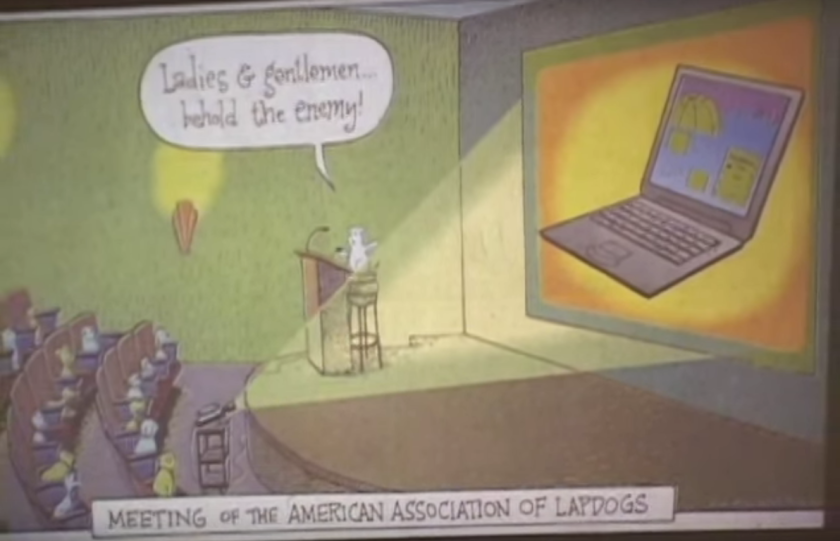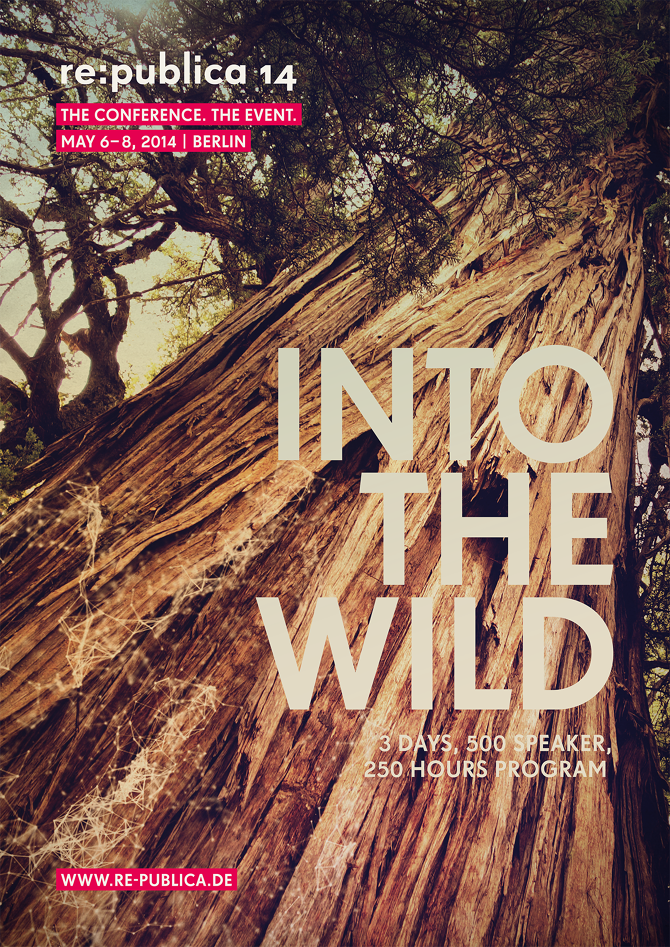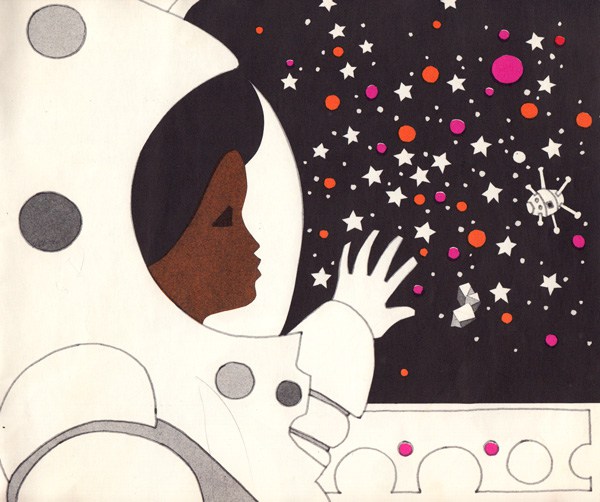Hello I moved this blog to my new site:
UTOPIAN DREAMING
Hope you come visit!
Category: Utopia
Donna Haraway: “From Cyborgs to Companion Species”

This is a joke on the impossibility of humanism in our contemporary world. It’s a joke on post humanism. It is, ladies and gentlemen, behold the enemy. It is of course also my particular passionate position of having abandoned my initial doppelganger,the cyborg, and embraced the dog.
“Donna Haraway presented her lecture as the 2003-2004 Avenali Chair in the Humanities at the Townsend Center for the Humanities, UC Berkeley. Haraway is a prominent theorist of the relationships between people and machines, and her work has incited debate in fields as varied as primatology, philosophy, and developmental biology. Haraway’s The Cyborg Manifesto, first published in 1985, is now taught in undergraduate classes at countless universities and has been reprinted or translated in numerous anthologies in North America, Japan, and Europe.”
The Companion Species Manifesto:
Dogs, People and Significant Otherness
Haraway’s A Cyborg Manifesto
Science, technology and socialist-feminism in the late twentieth century
❤
Paralysing Cynicism
There is a point where healthy essential scepticism slips into paralysing cynicism; where the complete absence of utopian thinking becomes a dystopia itself.
We are right to doubt that we ever will or indeed ever should arrive at Utopia but we are deluded and vulnerable if we fail to recognise the hard-earned utopian fragments all around us.
“all dystopias have utopias for a privileged few” @Oniropolis https://t.co/8UjwhupKk9
— Louison (@L0B0_) April 5, 2016
“We can do all manner of once-impossible things online while simultaneously being told, in the real world, we cannot take care of the most basic societal needs. We have 21st century technologies and 18th century political establishments. Something is rotten in the body politic and it will take more than snake-oil tonics to cure it.”
“Whilst mainstream architecture is more extravagant and bizarre than ever, the sense that it is for everyone has been greatly diminished. Always a mirror to the political climate, architecture is largely there to contain rather than liberate us, demanding our obedience rather than serving us and helping us to better ourselves.”
A common observation is that all utopias are dystopias but the opposite is also true; all dystopias have utopias for a privileged few. In dire times, we are wise to ask, “Who benefits from this?” just as much as we should ask “What are you selling?” of those evangelising about the future.
Dreaming of PostCapitalism
I’m not handing down a kind of peer reviewed, engineering certified thing. I’m offering a series of challenging ideas.
As I understand it, Paul Mason also tries to inspire some googlers to what I call utopian dreaming. It’s messy, there’s no one plan, no destination (“a big 200-year long kind of epochal change”), but there’s an urgent need for a collective effort to imagine which direction to take. A need for better alternatives to what just doesn’t work anymore.
“capital collapses because it cannot exist alongside shared knowledge.”
“When there is a general intellect, you can’t have private property.”
“… in World War II, we get this other adaptation, this huge new synthesis between technology, consumption, et cetera. One of the things we observe when, we look at social historians, at these moments of mutation and big change in capitalism, is that there’s
nearly always, when something goes wrong, the knee-jerk reaction is nearly always for the elite to try and solve it through pressure on wages, pressure on consumption.
But this time, it didn’t happen because the specific solution that was adopted when the old Keynesian economics of the 1970s and ’80s fell apart was what we call neoliberalism.
That is, a free market system in which wages were more or less strategically suppressed.”
why we might be facing strategic, big 200-year long kind of epochal change
clue number one:
“if you get a situation where capitalism is in trouble and it adapts through suppressing wages, then what it eventually does is it finds another solution to consumption, and that is credit.”
“So since about the 1990s, we have a situation where wages are suppressed for the mass of people, and yet credit is very, very much more available than it ever was.”
“What happens there is, it’s almost like a law of physics, but it’s economic. If you’ve got static incomes and ever-expanding credit, that at some point, the kind of wine collections and the art collections and the luxury apartments at Vauxhall Bridge cannot go on rising in value, and they just snap back.”
“We call that a boom-bust cycle.
and we lived through 3 in 15 years”
“First of all, it is corroding the price mechanism. if the reproduction cost of something is dictated by the actions Command-C, Command-V, then economics tells you that its price should fall to zero, or close to zero.Because you’re using zero energy, or almost no energy, almost no labor, and almost no materials. So if you smoke one inch of a cigarette, I can’t smoke that one inch.I can smoke the next inch, especially if it’s one of those cigarettes that you share. But I can’t smoke the same inch as you. It’s a rival good. Not true of an MP3 track. Not true of the database that builds a Boeing 787. You can copy it and use it at the exact same time for free.”
“Now Romer said in this situation, the only thing that keeps the price mechanism– i.e., things cost more than zero– is if you artificially create scarcity. Because information is now abundant.It’s unlike all other goods. Obviously, there are limits to it. The limits are storage and bandwidth.But information is essentially abundant, as far as most people are concerned.Information blurs the distinction between work and non-work, or what we used to call life.”
3. “working and producing in a non-managed way.”
Solarpunk, is it Utopian Dreaming?
“It’s hard out here for futurists under 30,” declares one manifesto. “We’re solarpunks because the only other options are denial or despair.”
Solarpunk & The New Utopians https://t.co/ZzD8braR0y Tx @futuresedge
— Rachel Armstrong (@livingarchitect) November 10, 2015
I read that Solarpunks do not like to be called utopian, but I think they are. In a good way, the one Cory Doctorow described in my last post. Great to know they exist. Looking forward to hear much more from them.
Solarpunk: Notes toward a manifesto https://t.co/NzRVxs0kDq @threadbare “Solarpunk is a future with a human face and dirt behind its ears.”
— Céline (@krustelkram) November 10, 2015
Cory Doctorow on Utopia
It’s not how well the system works, it’s what happens when it fails that distinguishes a utopia from a dystopia.
“UTOPIA” WILL HIT SHELVES IN 2017
“Of all the novels I’ve written, I’m most proud of Utopia. In it, I finally found a way to express all my fears about where we’re heading and all my hopes for how we might head it off. Everyone I know feels that inchoate dread that Occupy shorthanded as ‘things are fucked up and shit’, and that feeling’s given me the cold grue for most of a decade. Finally, I’m managed to get that feeling and where it comes from into an orderly narrative that — I hope — transfers it from my brain to yours. I want to make a world that works even when it’s broken down, a world where we see ourselves with a common destiny, where every person is owed a debt to, and owes a debt to, every other person.I want to make the world where our coming disasters are attended by outpourings of cooperation and empathy. Not because I find this aesthetically pleasing: because I want to live through those disasters, and I want my child to live through them. I want you to live through them, too, and your children.”
Dreaming in Germany
Another example of Utopian Dreaming. This time from a german comedian called Jan Böhmermann. I read some harsh critic about the project, but when refugee homes are burning, the Afd is on the rise, and “besorgte” Bürger marching side by side with Neo Nazis, seeing somebody imagine Germans rise like zombies to fight these guys …
It made me laugh.
Right now I could go nuts not only about Germany but the whole world. Fear, panic, and despair are almost all around, all the time. A comic relief, at least, lowers my tension. Maybe it even helps with the constant shock-induced paralysis, few seem able to get rid of?
It’s late, but I just might put on socks and sandals tonight.
Zombie Apocalypse and the Utopian Tradition
Utopian Dreams I almost forgot
In the first post on this blog, I wrote about the reason why I started it. I wrote I wanted to work on utopian art projects again (like I did when I was young), and don’t know where to start. But I just realized, writing the Utopian Children’s Book post, that I actually was part of three utopian projects not that long ago:

The idea was to make, share and remix art under the Free Culture License, telling the stories of all the amazing women of history nobody knows about. I think seeing female role models would inspire girls and boys to dream bold futures. I created free coloring pages, a game sprite, and even made 3rd place at Europe’s first live crowdfunding festival in Berlin (whose website is not online anymore, which I find annoying – only thing left is their crowdfunding campaign). But I found myself alone. It’s no fun to remix that way, and so I gave up (for now).
I think that’s the reason I almost forgot about it. Not nice to abandon your dreams.
(Also please remind me to never use “Hi there” in a blog again or promise any future posts)
If you think it was a good project , and it’s sad I gave up (even if you don’t), go help Anita Sarkeesian get her wonderful project funded (only 5 days left) :
Announcing “Ordinary Women” Crowdfunding Campaign
The more people hear these stories, the more people might want to create all kinds of art about these women, and maybe then there will be a chance to remix together.
You can read about it here.
I think it slipped my mind, because being part of the first E-learning and Digital Cultures Mooc was an utopian experience. I remembered that much more than my own project. Thinking about it now, the collaboration and fun I had during that time, inspired me to create Amazing Women of History.
How could I ever forget? I didn’t. This was by far the biggest and most beautiful project my partner Paula and I worked on so far. The amazing feeling of creating an atmosphere for so many people coming together to communicate and collaborate,being part of the wonderful team making re:publica possible. I have no idea why I didn’t think of it, when I wrote that first blog post.
Utopian Children’s books (I)
“For as long as she could remember, Regina Williams wanted to become an astronaut…”
Her friends just laugh at her and walk away, which leaves Regina all the more determined to pursue her dream.
It would be exactly a decade until Sally Ride became the first American woman in space, and nearly twenty years until Mae Jemison launched into the cosmos as the first African American astronaut.
For all their immeasurable delight,children’s books also have a serious cultural responsibility — they capture young minds and plant in them the seeds that blossom into beliefs about what is socially acceptable, what is right and wrong, and what is possible.
No words necessary to add to that.
G.T. Moore – Utopia – Reggae
How could I forget about music thinking about Utopia?



